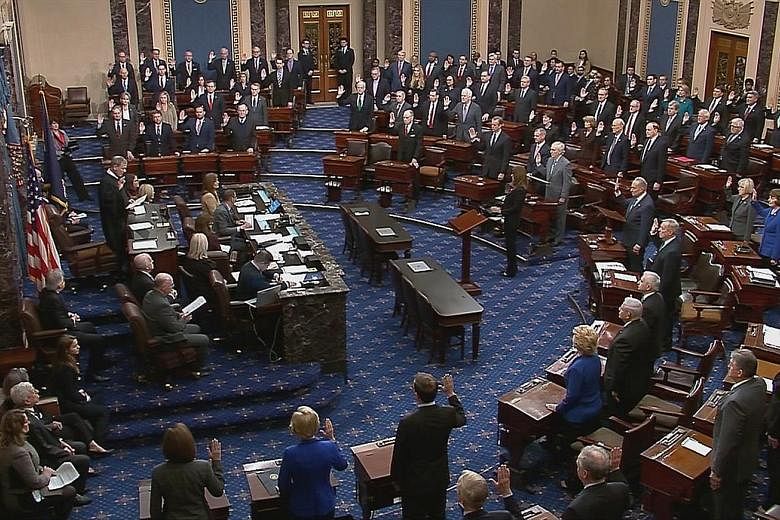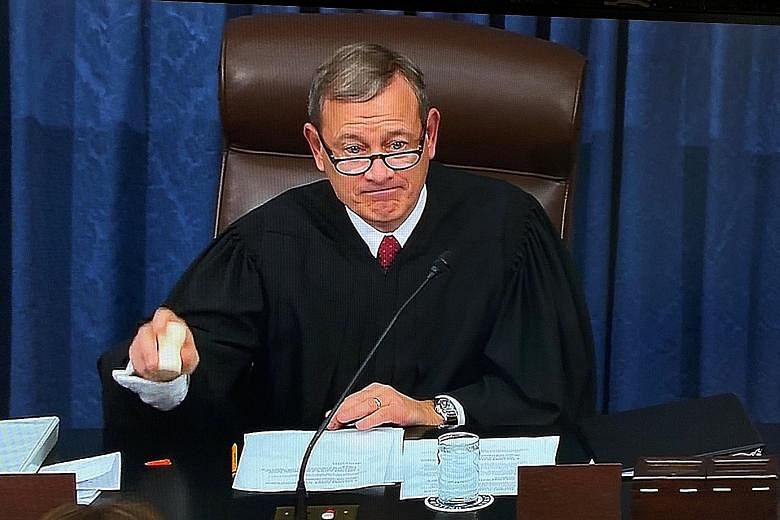The United States Senate formally began its impeachment trial of President Donald Trump on Thursday, as Chief Justice John Roberts was sworn in to preside over the proceedings and senators vowed to "do impartial justice" when deciding whether to remove him from office.
The two charges he faces - of abuse of power and obstruction of Congress regarding his conduct over Ukraine - were read out in the Senate at the start of what promises to be a divisive trial with a foregone conclusion: Mr Trump's acquittal, but along partisan lines.
The ceremonial beginning came amid more developments regarding Mr Trump's alleged pressure campaign against Ukraine to open an investigation into his political rival Joe Biden that would benefit him in the 2020 election.
A nonpartisan federal watchdog concluded that the Trump administration violated the law when it froze military aid to Ukraine which had been approved by Congress.
Democrats say that Mr Trump deliberately and improperly withheld the aid to strong-arm Ukraine into politically undermining Mr Biden.
Meanwhile, Mr Lev Parnas, an associate of Mr Trump's personal lawyer Rudy Giuliani, said the President "knew exactly what was going on" in Ukraine and had personally told a top aide that then US Ambassador to Ukraine Marie Yovanovitch should be fired.
His statements, given over several media interviews, follow the Democrats' release of texts and documents showing him working with Mr Giuliani and others to surveil Ms Yovanovitch and oust her from her post.
Ukraine announced on Thursday it was opening a criminal investigation into the alleged surveillance attempts.
After the ceremonial beginning, the Senate adjourned for the long holiday weekend and will resume the impeachment trial on Tuesday - when Mr Trump is scheduled to be in Davos attending the World Economic Forum.
Mr Trump, who has been on a foreign policy hot streak this week with the signing of the US-China phase one trade deal and the Senate's approval of the US-Mexico-Canada accord, said on Thursday that he will still attend the summit.
The Democrat-led House of Representatives has until today to file a legal brief outlining its argument, while the White House counsel has until Monday. Each will have the opportunity to rebut the other side before the trial resumes.
But Republicans and Democrats are still wrangling over the shape and duration of the trial, and will continue to do so in the early part of next week. Democrats want to be able to call more witnesses and introduce new evidence, while Republicans and the White House favour a short trial.
After the rules governing the trial have been established, a process which Senate Majority Leader Mitch McConnell indicated could take a few days, the trial will begin in earnest. Seven House impeachment managers will act as prosecutors, presenting the House's case against the President. Mr Trump's counsel will then respond.
The senators must sit silently through the proceedings under impeachment rules, and can submit questions in writing after both sides present their opening arguments.
The Senate is expected to sit six days a week, with only Sundays off.
The trial may last more than two weeks, keeping four Democratic senators who are presidential hopefuls - Mr Bernie Sanders of Vermont, Ms Elizabeth Warren of Massachusetts, Ms Amy Klobuchar of Minnesota and Mr Michael Bennet of Colorado - in Washington and largely off the campaign trail ahead of the crucial Iowa caucuses taking place on Feb 3.
It may also still be ongoing when Mr Trump gives his annual State of the Union address on Feb 4.


